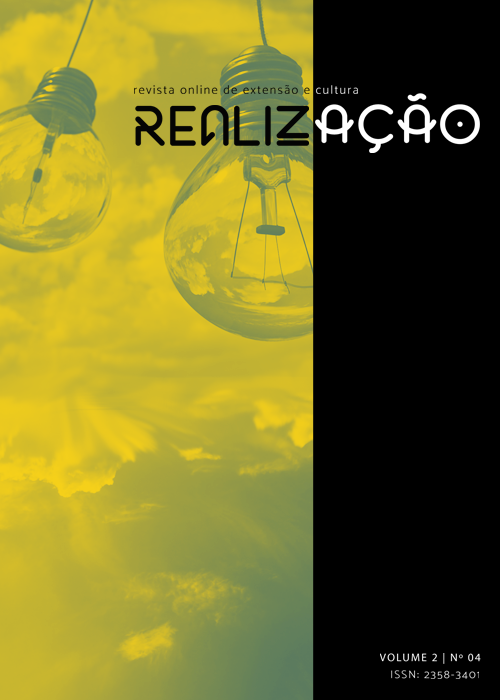Difusão do conhecimento sobre biotecnologia e biossegurança em escolas públicas de Dourados, MS
Palavras-chave:
Ensino médio, Formação complementar, Organismos geneticamente modificadosResumo
A Biotecnologia é uma ciência que faz uso de organismos vivos ou parte deles, para a produção de bens e serviços. No entanto, esta tecnociência tem gerado grandes polêmicas na sociedade, principalmente em relação à produção e consumo de alimentos geneticamente modificados. Observa-se que essa rejeição por grande parte da população, na maioria das vezes, é devido a pouca informação sobre o tema. Buscando contribuir neste aspecto, este trabalho foi desenvolvido com o objetivo de levar conhecimento sobre os temas que envolvem a Biotecnologia aos alunos do Ensino Médio das escolas públicas, incluindo informações a respeito da Biossegurança, que é a base para o desenvolvimento seguro dos produtos biotecnológicos, garantindo proteção à saúde humana, animal e ao meio ambiente. As informações foram transmitidas aos alunos de escolas públicas do município de Dourados (MS), através de palestras presididas pelos alunos extensionistas do projeto Biotecnologia & Biossegurança. Esta experiência possibilitou o esclarecimento de dúvidas sobre os temas que abrangem a Biotecnologia, além disso, muitos alunos mostraram interesse pela área, demonstrando que o diálogo entre Universidade e Comunidade se faz necessário.Downloads
Referências
BINSFELD, P. C. Biossegurança em Biotecnologia. Rio de Janeiro: Interciência, 2004.
BONIS, M. D.; COSTA, M. A. F. Educação em biossegurança e bioética: articulação necessária em biotecnologia. Ciência & Saúde Coletiva, v.14, n.6, p. 2107-2114, 2009.
CAIXETA, R. B.; BARBOSA-FRANCO, A. Acidente de trabalho, com material biológico, em profissionais de saúde de hospitais públicos do Distrito Federal, Brasil, 2002/2003. Cadernos de Saúde Pública, v.21, n.3, p.737-746, 2005.
MOTA, A. A. R. Transgenia no Brasil: eventos autorizados e cultivares registradas. 2011. 124 f. Monografia (Bacharelado em Agronomia), Universidade de Brasília, Brasília, 2011.
MÜLLER, I. C; MASTROENI, M. F. Tendência de acidentes em laboratórios de pesquisa. Biotecnologia Ciência & Desenvolvimento, v.33, n.1-8, p.101-108, 2004.
ODA, L. M.; SOUZA, G. D. Biossegurança como nova ciência: passado, presente e perspectivas futuras. In: BINSFELD, P. C. (org.). Biossegurança em biotecnologia. Rio de Janeiro: Interciência, 2004. p.4-23.
OPPERMANN, C. M. Manual de biossegurança para serviços de saúde. Porto Alegre: PMPA/SMS/CGVS, 2003.
TEIXEIRA, P.; VALLE, S. Biossegurança: uma abordagem multidisciplinar. 1 ed. Rio de Janeiro: Fiocruz; 1996.
SCHOLZE, S. H. C. Biossegurança e alimentos transgênicos. Biotecnologia Ciência e Desenvolvimento, v.9, n.2, p. 32- 34, 1999.
Downloads
Publicado
Como Citar
Edição
Seção
Licença
Copyright (c) 2015 Ana Taniely Prestes dos Santos, Danilo Ramos Spessoto, Igor Chiarelli Perdomo, Jaqueline Verconti Gandolfo, Peceu Magyve Ragagnin de Oliveira, Sâmela Beutinger Cavalheiro, Wirlaine Clauce Maciel, Emerson Machado de Carvalho, Simone Simionatto

Este trabalho está licenciado sob uma licença Creative Commons Attribution-NonCommercial-ShareAlike 4.0 International License.
Autores que publicam nesta revista aceitam as normas de publicação, bem como, concordam com os seguintes termos:
(a) O Conselho Editorial se reserva ao direito de efetuar, nos originais, alterações da Língua portuguesa para se manter o padrão culto da língua, respeitando, porém, o estilo dos autores.
(b) Autores mantêm os direitos autorais e concedem à revista o direito de primeira publicação, com o trabalho simultaneamente licenciado sob a Creative Commons Atribuição-NãoComercial-CompartilhaIgual 4.0 Internacional que permite: Compartilhar — copiar e redistribuir o material em qualquer suporte ou formato e Adaptar — remixar, transformar, e criar a partir do material. A Creative Commons Atribuição-NãoComercial-CompartilhaIgual 4.0 Internacional considera os termos seguintes:
- Atribuição — Você deve dar o crédito apropriado, prover um link para a licença e indicar se mudanças foram feitas. Você deve fazê-lo em qualquer circunstância razoável, mas de nenhuma maneira que sugira que o licenciante apoia você ou o seu uso.
- NãoComercial — Você não pode usar o material para fins comerciais.
- CompartilhaIgual — Se você remixar, transformar, ou criar a partir do material, tem de distribuir as suas contribuições sob a mesma licença que o original.
- Sem restrições adicionais — Você não pode aplicar termos jurídicos ou medidas de caráter tecnológico que restrinjam legalmente outros de fazerem algo que a licença permita.


